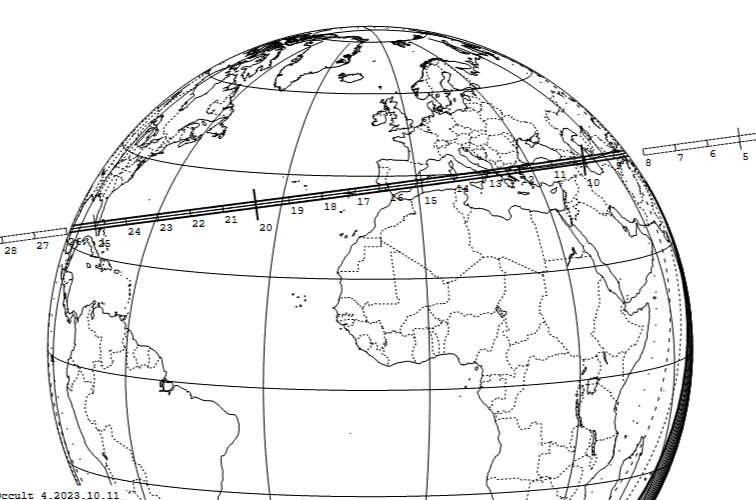Betelgeuse will dim or disappear on December 11 or 12
On December 11 or 12, 2023, – depending on your location – observers along a narrow path in southern Europe and across the Atlantic Ocean into the Bahamas, southern Florida and part of Mexico will be able to see Betelgeuse become fainter – or maybe even disappear – for several seconds. Asteroid Leona will pass in front of the famous red supergiant star of Orion, temporarily blocking some of its light. Betelgeuse’s light will look dimmed or extinguished for up to seven seconds. For more precise maps of the event, check out the map on this page of the Occult Watcher website.
So, for example, in Cordoba, Spain, the mid-point of the event will be at about 1:15:45 UTC, or 2:15 a.m. local time, on December 12, 2023. And in Miami, Florida, the mid-point of the event will be at about 8:24:54 p.m. local time on December 11, 2023. That’s the same as 1:24:54 UTC on December 12, 2023. Find the exact timing for your location here.
Are you outside the viewing area? Check out this simulation by the Virtual Telescope Project, showing how Orion will temporarily lose its bright, orangish shoulder star.

The 2024 lunar calendars are here! Best Christmas gifts in the universe! Check ’em out here.
An amazing opportunity for astronomers!
This event is a great opportunity for astronomers to learn more about both the enigmatic star Betelgeuse and little asteroid Leona. Currently, both the size and shape of Betelgeuse and Leona are uncertain. Observations during the pass of Leona in front of Betelgeuse will help astronomers pin down their sizes and other features. As Sky & Telescope said:
By precisely timing the duration of the occultation from many sites simultaneously, astronomers can refine their knowledge of the size and shape of the asteroid. They may even be able to map Betelgeuse’s strangely large convective cells, by which the star brightens and darkens for months at a time.
As the asteroid moves across the stellar disk, it will cross over large convection cells, which are brighter than most of the the star’s visible surface. Thus, measuring the brightness of the star throughout the occultation will prove vital.
Betelgeuse is a temperamental star
Betelgeuse is already famous for how it varies in brightness. And, since 2019, there’s been a noticeable uptick in the brightening and dimming of Betelgeuse. It’s the nearest red supergiant star to Earth, lying some 1,000 light-years away. It will explode someday, though that might be today or thousands of years from now. A paper in 2023 said that it might explode within “tens of years.” That would be amazing to see!
If it were to explode, we would see it as an incredibly bright star, even visible in daylight for roughly a year until it faded away completely, leaving a darkness where Orion’s shoulder was. Fortunately, Earth is too far away for this explosion to harm, much less destroy, life on Earth.
Bottom line: On December 11 and 12, 2023, Betelgeuse will dim, or possibly even disappear, for several seconds as asteroid Leona passes in front of it.